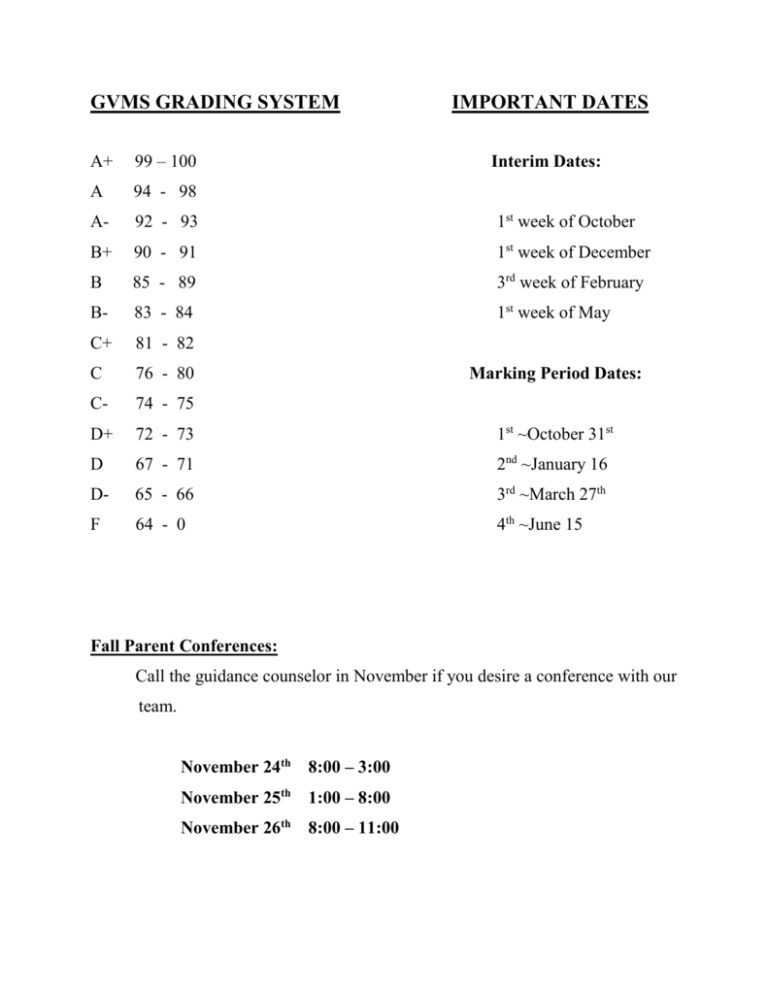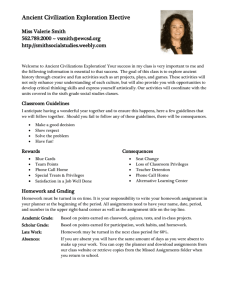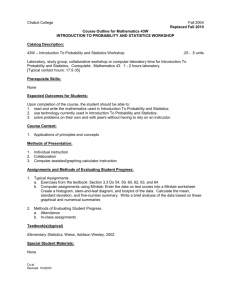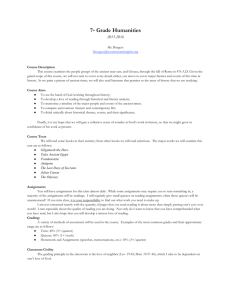GVMS GRADING SYSTEM - Garnet Valley School District
advertisement

GVMS GRADING SYSTEM IMPORTANT DATES A+ 99 – 100 A 94 - 98 A- 92 - 93 1st week of October B+ 90 - 91 1st week of December B 85 - 89 3rd week of February B- 83 - 84 1st week of May C+ 81 - 82 C 76 - 80 C- 74 - 75 D+ 72 - 73 1st ~October 31st D 67 - 71 2nd ~January 16 D- 65 - 66 3rd ~March 27th F 64 - 0 4th ~June 15 Interim Dates: Marking Period Dates: Fall Parent Conferences: Call the guidance counselor in November if you desire a conference with our team. November 24th 8:00 – 3:00 November 25th 1:00 – 8:00 November 26th 8:00 – 11:00 GENERAL INFORMATION AND EXPECTATIONS 1. Students are expected to come prepared for class every day with all necessary materials. 2. Students are permitted to go to their lockers at scheduled times only. 3. Independent Skills Class, held during third period, is a time to complete class work, begin homework, go to the library, or seek help from teachers. 4. Grades are calculated based on daily homework, quizzes, classwork, tests, and projects or reports. 5. Textbooks must be covered at all times. If a cover becomes worn or torn, it should be replaced immediately. 6. Students are expected to know and follow the rules set forth in the student handbook. CLASS EXPECTATIONS 1. Always demonstrate concern toward others and respect their questions and opinions. 2. Remember – no question is a stupid question. If you have it, someone else might too. 3. Be on time! 4. Respect and take care of all classroom supplies. Please ask before removing supplies from the classroom 5. Complete all assignments regularly and on time. 6. Come prepared for class with your notebook, textbook, writing utensil, student planner and completed assignments. 7. No eating or drinking unless it is your snack time. 8. You are not permitted to chew gum in school. GOALS FOR ALL SIXTH GRADERS The sixth grade teachers have developed the following goals to enhance the academic program. In order for these goals to be met successfully, everyone’s cooperation is essential. The goals for our students include: 1. Learning to cooperate in a variety of situations. 2. Practicing self-control. 3. Showing respect for others and their possessions. 4. Following verbal and written directions throughout the school day. 5. Demonstrating good listening skills in all areas. 6. Becoming more self-reliant. TIPS FOR ASSISTING IN YOUR CHILD’S SUCCESS 1. Make a place for your child to study which provides the least amount of distraction. 2. Set up a designated time to study and complete homework assignments. 3. Establish a routine, for example, a place where books are placed when your child comes home. 4. Check to make sure everything is finished and ready for the following morning. 5. Pack the backpack after finishing homework. 6. Have extra supplies at home such as filler paper, pencils, ruler, and dictionary. 7. Check the daily assignments. 8. Check weekly to see if your child’s backpack needs to be reorganized. 9. Check to see if all books are covered. 10. Instill in your child that school matters are his or her responsibility. 11. You are there to help, but if homework is forgotten, it is not the parent’s fault. SIXTH GRADE HOMEWORK POLICY 1. There will be 2 to 4 homework assignments per class per week. 2. All homework assignments are posted in the classroom. 3. All homework assignments are to be completed neatly according to the oral and written directions provided. 4. Assignments must be completed and handed in on time. 5. Students must have their homework ready to be checked or collected at the beginning of the class period. 6. Following an absence, students are expected to request, complete, and hand in missed work on time. 7. In case of absence, the student will have two times the number of days absent to make up his or her work with no penalty. For example, with a two-day absence, the student will have four days to complete assignments. Please note that it serves the student’s best interest to complete the assignments as soon as possible. 8. When students are absent for two or more days, the parents may call the counselor or the teacher’s voice mail to request assignments. The teacher or counselor will pass the information on to the other teachers on the team. 9. All students are required to record their assignments in their Daily Planner. If the planner is lost, a new one can be purchased from the guidance office. 10. Homework is part of the final grade for each class. SIXTH GRADE MATHEMATICS Text: Middle School Math, McDougal Littell, 2005 The Middle School mathematics addresses the objectives of our Garnet Valley mathematics curriculum as well as satisfies the objectives presented in the PA State Academic Standards for Mathematics. The sixth grade students work with Course 1 of McDougal Littell’s Middle School Math. Course 1 provides a solid foundation in fundamental middle grade topics, such as decimals and fractions, with an age-appropriate introduction to key algebraic topics. Problem solving is an essential skill for the students to master. Before the first chapter in the text, the Problem Solving Practice will help the students focus on the big picture of problem solving. Building on past experiences, this initial unit encourages students to approach problems using a variety of strategies. These strategies, once reviewed, will be revisited throughout the year. The second area of focus deals with Statistics and Data Analysis. Chapter 2 focuses on real-world data, a unique and motivational topic with which to begin the school year. The level of thought required of students increases from analysis of data to interpretation to drawing conclusions. Geometry topics are integrated throughout the year, providing a solid preparation for future math studies. The topics grow in depth and complexity as students build their measurement skills, increase their understanding of geometric relationships, and develop visualization skills. Methods of instruction and assessment will vary throughout the year. Large group instruction and demonstrations, small group interactions and discussions, and independent work time will all be utilized at appropriate times to help students perform to their fullest potential. Assessment techniques will range from the traditional quizzes and tests to journal writing, responses to open-ended prompts, projects and demonstrations, observation, and class involvement. Students will also complete self-assessments throughout the year and be involved in formulating plans for improvement and success. The Following Topics Constitute the Mathematics Scope and Sequence for the Year: Problem Solving Data Analysis and Statistics Order of Operations Algebraic Properties Working with Equations Estimating Operations with Decimals Working with the Metric System Operations with Fractions Working with the Customary System of Measurement Working with Ratios, Proportions, and Percents Two Dimensional Geometry Three Dimensional Geometry Probability Working with Integers SIXTH GRADE LANGUAGE ARTS Texts— The Language of Literature, McDougal Littell, 2006 Write Source, Great Source Education Group, a division of Houghton Mifflin, 2005 Elements of Writing, Holt, Rinehart, and Winston, 1998 The writing of informative, narrative, and persuasive pieces will be emphasized throughout the year. The five domains of writing will serve as tools for evaluation by both the students and teachers. These domains include Focus, Content, Style, Organization, and Conventions. Conventions such as spelling, grammar, usage, and mechanics will be emphasized in the context of writing throughout the year. Writing across the curriculum will be supported in English class. Writing assignments often correspond to reading activities. Using The Language of Literature as well as high interest, award-winning novels, students will integrate skills such as vocabulary, reading comprehension, inferential thinking, predicting, drawing conclusions, and other higher-level thinking skills. Students will participate in lively class discussions that offer opportunities to view situations from a variety of perspectives. Students will report information in a variety of ways, such as through written reports, oral reports, in small and large groups, via projects, or through traditional tests. A schedule for Independent Reading assignments and required due dates will be given to most students in September for the entire year. Students will complete written and oral reports, as well as use our Accelerated Reader program. Reading, English, and spelling will be integrated throughout the year. SIXTH GRADE SCIENCE Texts: Astronomy, Prentice Hall, 2007 Inside Earth, Prentice Hall, 2007 Matter, Globe Fearon, 2004 In an effort to further align curriculum to state standards, sixth grade science has adopted three new textbooks: Matter, Inside Earth, and Astronomy, along with two STC (Science and Technology for Children) kits: “Earth in Space” and “Catastrophic Events”. The STC kits are designed to engage adolescents in inquiry-based science learning. Keeping inquiry at the center of the learning process fosters student curiosity and enables students to learn new concepts in a real-world setting. Students will learn to plan and conduct their own experimental procedures. They will devise their own data tables and analyze their own results. These kits were designed to address the unique characteristics of the middle school learner. This year we plan to develop students’ abilities to make predictions, explore causal relationships, discover patterns, and generate explanations based on their observations. The “Earth in Space” unit will focus on the earth as it functions as a system with the sun and the moon. The Astronomy textbook will be used with this unit. In conjunction with the Inside Earth textbook, the “Catastrophic Events” unit will focus on the heating and cooling of the earth’s surface and the way in which storms form. Lastly, using the Matter textbook, the matter unit will cover properties of matter, density, elements and atoms, compounds, mixtures, and solutions. SIXTH GRADE SOCIAL STUDIES Texts: Medieval Times, Prentice Hall, 2001 The Ancient World, Prentice Hall, 2005 This year the sixth grade students will focus on the geography, history, culture, government, and economics of ancient civilizations. We will cover the Beginnings of Human Society, the Fertile Crescent, Ancient Egypt, Ancient India, Ancient China, Ancient Greece, Ancient Rome, and a portion of the Middle Ages. There are two textbooks that are used to cover this curriculum. The first text, The Ancient World, covers ancient history. The second, Medieval Times, covers the Middle Ages. In addition to the student text, each student can also receive a CD for the Ancient World text, available upon parental request. Within the social studies curriculum, students are afforded many learning opportunities. They will practice reading and writing skills. They will use research skills to complete projects. Vocabulary skills are developed. Maps, tables, and graphs are used. Online activities are provided, and critical thinking skills are practiced.








